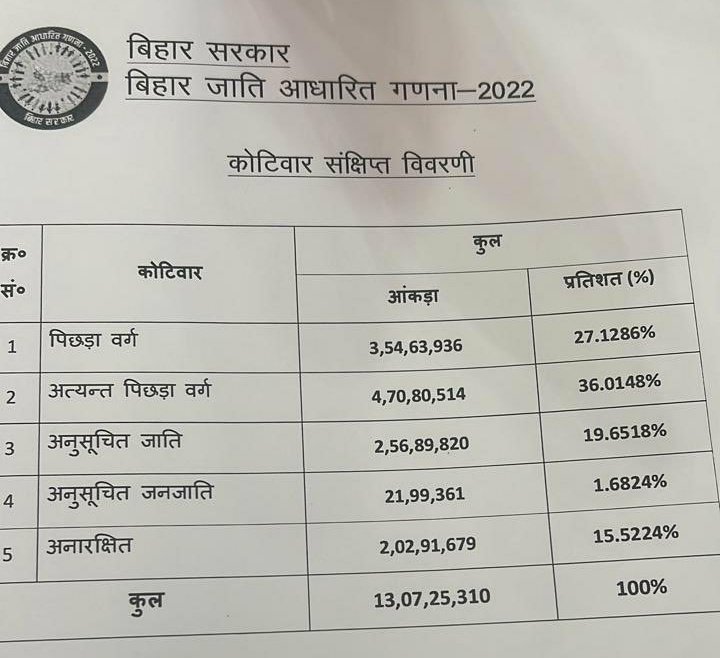Bihar caste-based survey risks sparking a 'political storm'
The Indian National Congress would like to see such a survey conducted across India, while the ruling BJP has accused the eastern state of trying to divide society along sectarian lines. In fact, the survey’s aim is to help broaden quotas in public services and education reserved for disadvantaged classes to other sections of the population as well. Sister Dorothy Fernandes, the survey generates fears “because the upper castes have ruled the country for years.”
Patna (AsiaNews) – Earlier this month, the findings of the Bihar Caste-based Survey-2022 were released. Located in eastern India, Bihar is ruled by a coalition government.
The survey found that the Other Backward Classes (OBCs) make up 63 per cent of the state’s population, Scheduled Castes (SCs) 19 per cent, Scheduled Tribes (STs) 1.68 per cent, and the Upper Castes (Savarnas) 15.52 per cent.
"The caste survey has created a political storm in the country and frightened the central government because the upper castes have ruled the country for years," said Sister Dorothy Fernandes of the Union of Sisters of the Presentation of the Blessed Virgin Mary speaking to AsiaNews.
The survey found that the Yadav, a peasant-pastoral community, are the largest group with over 14 per cent of the population.
With respect to religion, 82 per cent are Hindu and almost 18 per cent Muslim. Jains, Christians, Sikhs and non-believers make up less than 1 per cent.
The state government began collecting survey data in January, after the central government said it would collect data only for scheduled castes and tribes.
The last nationwide census in which all castes and tribes were included dates back to 1931.
Prime Minister Narendra Modi’s ultranationalist Bharatiya Janata Party (BJP) has accused the Bihar government of fuelling inter-ethnic rivalries by dividing the population along sectarian lines and seeking to return to classifying society into castes despite their official abolition in the 1950s.
However, India’s lower castes have been traditionally discriminated; for this reason, quotas have been implemented in the public sector and in education for SCs and STs, but not for other disadvantaged groups.
In Bihar, the ruling coalition government formed by an alliance that includes the Indian National Congress (INC), the Janata Dal (United), and the Rashtriya Janata Dal, believe that a caste-based survey can help extend quotas to wider sections of the population.
Bihar Chief Minister Nitish Kumar welcomed the release of survey data. “Caste census not only revealed the castes, but also gave information about the economic condition of everyone,” he wrote on X.
“However,” for Sister Dorothy Fernandes, who has been working with the poor in the state capital Patna and rural areas since 1997, “when we think of the political parties, none, if I may say so, subscribes to the cause of the poor,” who “have always been given crumbs that fall from the table.”
“Our only hope is that the lower castes come to power and deliver good government to the country, becoming the true representatives of the people, in favour of the whole community, not just their family. In this sense, much still needs to be done to educate people.”
Sister Fernandes works with the urban poor, whom she describes as "those who, with the sweat of their brow, contribute in an invisible and silent way to the economy of the city, yet are treated very harshly by city people.”
In the opposition at the union (federal) level, INC leader Rahul Gandhi launched the slogan “rights proportional to the population” (jitni aabadi, utna haq) whereby representatives should proportionally reflect the caste distribution in the population.
Several studies found in fact that upper castes in India own 40 per cent of the national wealth, occupy almost 90 per cent of leadership positions in the media and almost all top positions in university faculties, as well as positions of power in government administrations.
Rahul Gandhi pointed out that, although OBCs, SCs and STs constitute 84 per cent of the population in Bihar, only three officials with an OBC background manage 5 per cent of the central government’s budget.







.png)










